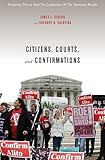Citizens, Courts, and Confirmations : Positivity Theory and the Judgments of the American People / Gregory A. Caldeira, James L. Gibson.
Material type: TextPublisher: Princeton, NJ : Princeton University Press, [2009]Copyright date: ©2009Edition: Course BookDescription: 1 online resource (240 p.) : 7 line illus. 29 tablesContent type:
TextPublisher: Princeton, NJ : Princeton University Press, [2009]Copyright date: ©2009Edition: Course BookDescription: 1 online resource (240 p.) : 7 line illus. 29 tablesContent type: - 9780691139883
- 9781400830602
- 347.73/14092 22
- KF8776 .G53 2009eb
- online - DeGruyter
- Issued also in print.
| Item type | Current library | Call number | URL | Status | Notes | Barcode | |
|---|---|---|---|---|---|---|---|
 eBook
eBook
|
Biblioteca "Angelicum" Pont. Univ. S.Tommaso d'Aquino Nuvola online | online - DeGruyter (Browse shelf(Opens below)) | Online access | Not for loan (Accesso limitato) | Accesso per gli utenti autorizzati / Access for authorized users | (dgr)9781400830602 |
Browsing Biblioteca "Angelicum" Pont. Univ. S.Tommaso d'Aquino shelves, Shelving location: Nuvola online Close shelf browser (Hides shelf browser)

|

|

|

|

|

|

|
||
| online - DeGruyter Shakespeare and Elizabeth : The Meeting of Two Myths / | online - DeGruyter From the Ground Up : Translating Geography into Community through Neighbor Networks / | online - DeGruyter Friction : An Ethnography of Global Connection / | online - DeGruyter Citizens, Courts, and Confirmations : Positivity Theory and the Judgments of the American People / | online - DeGruyter Why Not Socialism? / | online - DeGruyter Contracting States : Sovereign Transfers in International Relations / | online - DeGruyter How Do You Know? : The Economics of Ordinary Knowledge / |
Frontmatter -- Contents -- Figures and Tables -- Preface -- CHAPTER ONE. Introduction -- CHAPTER TWO. Knowing about Courts -- CHAPTER THREE. The Popular Legitimacy of the United States Supreme Court -- CHAPTER FOUR. Institutional Loyalty, Positivity Bias, and the Alito Nomination -- CHAPTER FIVE. A Dynamic Test of the Positivity Bias Hypothesis -- CHAPTER SIX. Concluding Thoughts, Theory, and Policy -- APPENDIX A. Survey Design: The 2005 Survey -- APPENDIX B. The Representativeness of the Panel Sample -- APPENDIX C. The Supreme Court and the U.S. Presidential Election of 2000: Wounds, Self-Inflicted or Otherwise? -- References -- Index
restricted access online access with authorization star
http://purl.org/coar/access_right/c_16ec
In recent years the American public has witnessed several hard-fought battles over nominees to the U.S. Supreme Court. In these heated confirmation fights, candidates' legal and political philosophies have been subject to intense scrutiny and debate. Citizens, Courts, and Confirmations examines one such fight--over the nomination of Samuel Alito--to discover how and why people formed opinions about the nominee, and to determine how the confirmation process shaped perceptions of the Supreme Court's legitimacy. Drawing on a nationally representative survey, James Gibson and Gregory Caldeira use the Alito confirmation fight as a window into public attitudes about the nation's highest court. They find that Americans know far more about the Supreme Court than many realize, that the Court enjoys a great deal of legitimacy among the American people, that attitudes toward the Court as an institution generally do not suffer from partisan or ideological polarization, and that public knowledge enhances the legitimacy accorded the Court. Yet the authors demonstrate that partisan and ideological infighting that treats the Court as just another political institution undermines the considerable public support the institution currently enjoys, and that politicized confirmation battles pose a grave threat to the basic legitimacy of the Supreme Court.
Issued also in print.
Mode of access: Internet via World Wide Web.
In English.
Description based on online resource; title from PDF title page (publisher's Web site, viewed 30. Aug 2021)


